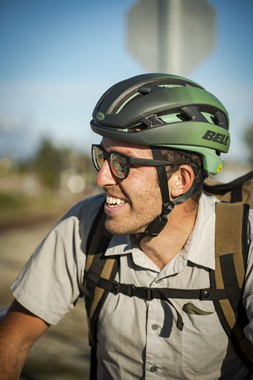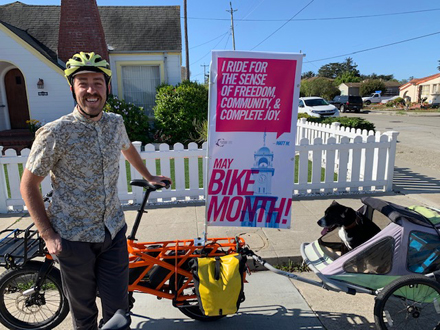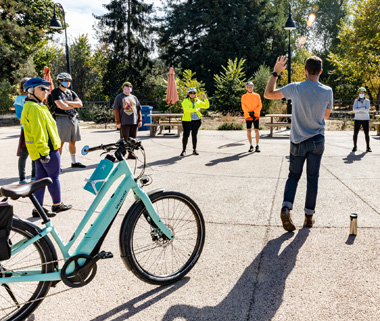1. Tell us a bit about yourself, your background, and how your path led to where you are today.
I grew up in Sacramento, CA. My dad was a therapist and my mom worked for CA State Parks, she was one of the first female state park rangers back in the 1970s. I was an active kid, and spent time growing up exploring state parks around California, developing a love for nature and the outdoors. At around 16, I found the bike as my freedom machine, I couldn’t afford a car and needed to get around. Naturally, biking for transportation in high school radicalized me and it became part of my identity. I started developing a lifestyle built around where I could reach by bike, a functional radius where my school, after school, work, relationships, etc. took place. I landed at UCSC in 2008, majoring in Environmental Studies with an emphasis in natural history and environmental education. The bike came with me. I worked as a work study student for state parks during college, interned at Life Lab, local school gardens, the Museum of Natural History, the Santa Cruz Green Wharf project, worked on various field ecology projects, but also got involved in bike advocacy through the UCSC student environmental center and managed the UCSC Bike Library for two years. I started working for the Santa Cruz Museum of Natural History in 2011 and kept working there until after I graduated.
parks around California, developing a love for nature and the outdoors. At around 16, I found the bike as my freedom machine, I couldn’t afford a car and needed to get around. Naturally, biking for transportation in high school radicalized me and it became part of my identity. I started developing a lifestyle built around where I could reach by bike, a functional radius where my school, after school, work, relationships, etc. took place. I landed at UCSC in 2008, majoring in Environmental Studies with an emphasis in natural history and environmental education. The bike came with me. I worked as a work study student for state parks during college, interned at Life Lab, local school gardens, the Museum of Natural History, the Santa Cruz Green Wharf project, worked on various field ecology projects, but also got involved in bike advocacy through the UCSC student environmental center and managed the UCSC Bike Library for two years. I started working for the Santa Cruz Museum of Natural History in 2011 and kept working there until after I graduated.
An abridged post college account would look something like this. I went on a cross country bike tour after college, leaving my house in Seabright and biking to Portland, OR then headed for Portland, ME. I was hit by a car in Montana one month into my trip and broke my leg. After a quarter life crisis, I healed up, and moved to South America for most of 2013, farming, volunteering, birding, and backpacking to Tierra del Fuego. I came back to Santa Cruz in 2014 and for a couple years worked seasonally as a field technician for NOAA Fisheries, bike shop part time, and bike touring the rest of the time. During this time, it became clear to me that conservation biology in the way I was doing it with NOAA left me demoralized, disenchanted, and hungry for more community based non profit environmental work. I didn’t need to measure the swim performance of juvenile salmon in a degraded river ecosystem to know that we (as in humanity) had to change our ways, and do it, yesterday.
In 2015, I took a full time position with Save Our Shores, a local non profit working on ocean and coastal conservation through education, advocacy, and direct action. I ran programs there for a little more than two years before I took a position at Ecology Action working on bike transportation. In many ways, this role was a coalescence of most of my personal and professional experience for the 10 years prior and it was a perfect fit.
2. What does Sustainability mean to you?
Sustainability to me means a lot of things. I have a material way of looking at it, and I have a psycho spiritual way of looking at it. In both, it’s a lot about rightsizing your life, but also living it. Live consciously, knowing our technologically advanced, globalized world, means our individual footprint can be staggeringly large and more impactful than we think. Materially, try to live light, eat mostly plants, shop local, walk and bike places, moderate your consumption, buy used, don’t buy at all, plant drought tolerant plants, grow food, get involved in your community to support your neighbors thrive, especially those who have been historically marginalized and left without opportunity. Sustainability is also about balancing your outputs and inputs. Do work, leave time for play. Question, contend, and fight against systems that have led us to this moment of ecological emergency and also get to know your neighbors, cultivate joy, and work on resourcing yourself to prepare for the fight tomorrow, and the next day, and the day after that. The world is big, and complicated, and messy and there are plenty of reasons for despair and even more reasons for hope. So pace yourself, but keep moving forward.
3. A lot of Ecology Action’s initiatives, such as Bike to work, Bike Month, Bike to School are some examples of effective long lasting biking programs that have “convinced” many folks in using their car a lot less. Can you speak of the challenges and successes that you have experienced running these programs in all of these years?
Challenges: we are living in a society built around the car. A strong American identity around independence and automobility have infiltrated all aspects of our lives, and thus active transportation often feels like we are battling  uphill with a headwind. Roads, highways, parking lots, sprawling development, issues with affordable housing all contribute to a car centric world and it’s a difficult cycle to break. That said, helping people go from contemplation, to trial, to practice, and into regular biking is such a rewarding process that can give people freedom and mobility for the rest of their lives. Some of our recent successes we’ve seen are over the last five years of running the Santa Cruz County Bike Challenge, employing gamification, incentives, and rider level specific support to encourage people to take the next step for them. We’ve been encouraged to see all riders from beginner, to occasional, to regular all ride their bikes more often, including trips to and from work and for transportation. These challenges and events like Walk and Roll to School help by giving people a job to do for a day, or a month and positively reinforcing the action and encouraging more riding. Eventually, people just spin off into their own self created positive feedback loops and feel the joy, excitement, and empowerment of moving by bike.
uphill with a headwind. Roads, highways, parking lots, sprawling development, issues with affordable housing all contribute to a car centric world and it’s a difficult cycle to break. That said, helping people go from contemplation, to trial, to practice, and into regular biking is such a rewarding process that can give people freedom and mobility for the rest of their lives. Some of our recent successes we’ve seen are over the last five years of running the Santa Cruz County Bike Challenge, employing gamification, incentives, and rider level specific support to encourage people to take the next step for them. We’ve been encouraged to see all riders from beginner, to occasional, to regular all ride their bikes more often, including trips to and from work and for transportation. These challenges and events like Walk and Roll to School help by giving people a job to do for a day, or a month and positively reinforcing the action and encouraging more riding. Eventually, people just spin off into their own self created positive feedback loops and feel the joy, excitement, and empowerment of moving by bike.
4. What other initiatives and programs that promote bike ridership you are proud of, and have been on the forefront of your efforts as of late?
Well, I mean, I would be remiss to not mention Slugbikelife! We just found out in December that Slugbikelife was awarded a second round of funding through the Active Transportation Program for $700k, covering another three years of bike education, encouragement, and safety at UCSC. Working with UCSC and our team here at EA to develop and deliver Slugbikelife is fun and challenging work, and the testing grounds for innovative university based bike programs. We’re excited to keep developing this work and serving hundreds of UCSC affiliates to gain access to bike equipment, education, encouragement, and resources each year.
In late 2021, we helped launch with the City of Santa Cruz an equity focused e-bike rebate program for individuals who work in downtown Santa Cruz and/or for the City of Santa Cruz. This program is somewhat unique among e-bike incentive programs in that it includes a bike safety training component and the money is available up front in the form of a voucher for instant savings. We also built in a base rebate of $400 and income qualified rebate of $800 to address the needs of lower income community members. Why does this matter? E-bikes are one of the single most effective ways of reducing and replacing shorter car trips of which over 50% in Santa Cruz County are three miles or less, an eminently bikeable distance, especially with a pedal assist ebike. Many of the known barriers to biking more often like distance, hills, effort, time, cargo, kids…all can be addressed by ebikes.
5. What do you hope to see happen in Santa Cruz biking future, and what are some aspirations you have for the city (and county) especially now with the $ 115 million in funding from the California Active Transportation Program?
We are well positioned in the social infrastructure side of things, with healthy amounts of education and encouragement happening in Santa Cruz County. What we desperately need more of is safe bicycle infrastructure. We need to create a safe bike network where ordinary everyday people can leave their homes and see biking as a viable, comfortable, and convenient form of transportation. Specifically though, moving ahead with the rail trail across Santa Cruz County will no doubt be a major active transportation boom, but I want to additionally see a widespread role out of protected bike lanes, bike boulevards, low stress bike route designation, green pavement treatments, roundabouts and road diets, more incentives and rebate programs. Biking needs to be seen and supported by every jurisdiction. I’m totally excited for the return and expansion of Santa Cruz County bike share, where eventually over 1000 bike share bikes will be deployed from westside Santa Cruz to Watsonville.
We need to create a safe bike network where ordinary everyday people can leave their homes and see biking as a viable, comfortable, and convenient form of transportation. Specifically though, moving ahead with the rail trail across Santa Cruz County will no doubt be a major active transportation boom, but I want to additionally see a widespread role out of protected bike lanes, bike boulevards, low stress bike route designation, green pavement treatments, roundabouts and road diets, more incentives and rebate programs. Biking needs to be seen and supported by every jurisdiction. I’m totally excited for the return and expansion of Santa Cruz County bike share, where eventually over 1000 bike share bikes will be deployed from westside Santa Cruz to Watsonville.
6. Is there anything else about the work you do that you would like to share?
Slugbikelife at UCSC exists to support more UCSC affiliates biking safely and more often. If you are reading this and wondering how you can get involved in the project or help bring more biking resources to students, staff, or faculty please reach out, we’d love to hear from you!
7. Lastly, what do you do for fun outside of work?
I’m an amateur photographer, I love birding, surfing is SO fun, bikepacking and exploring the world by two wheels ceases to amaze and capture my imagination so scheming my next bike trip is almost always in development.
